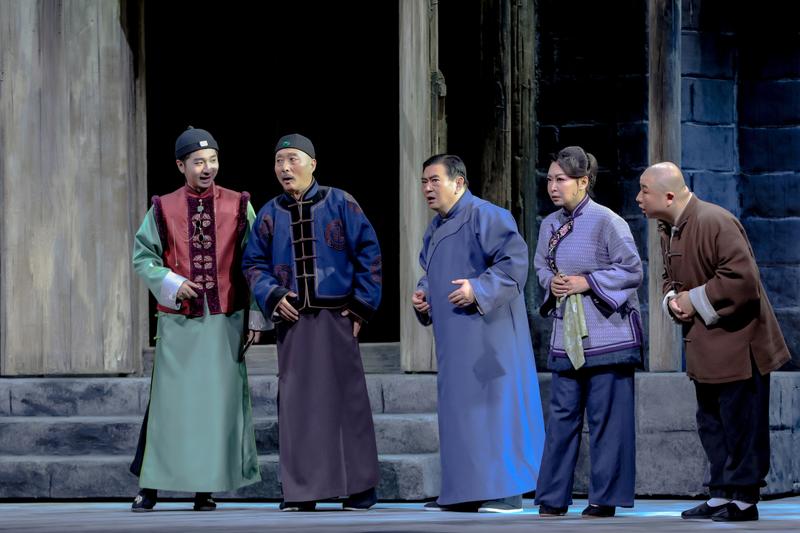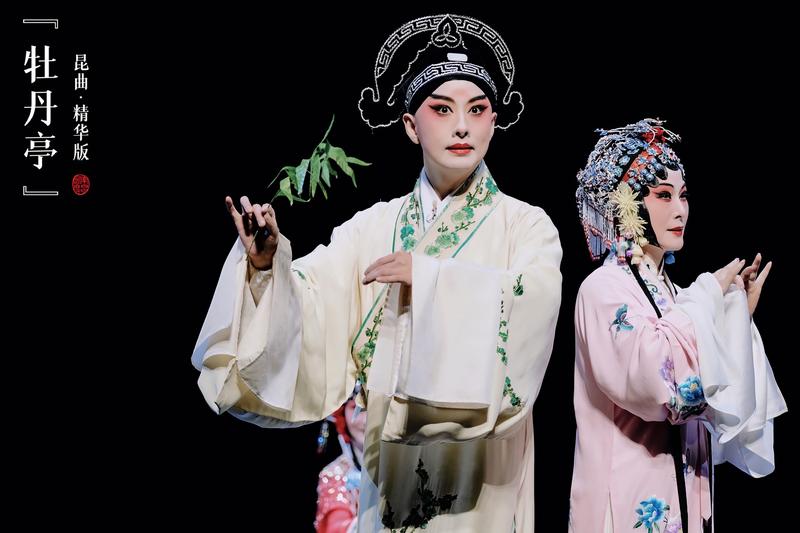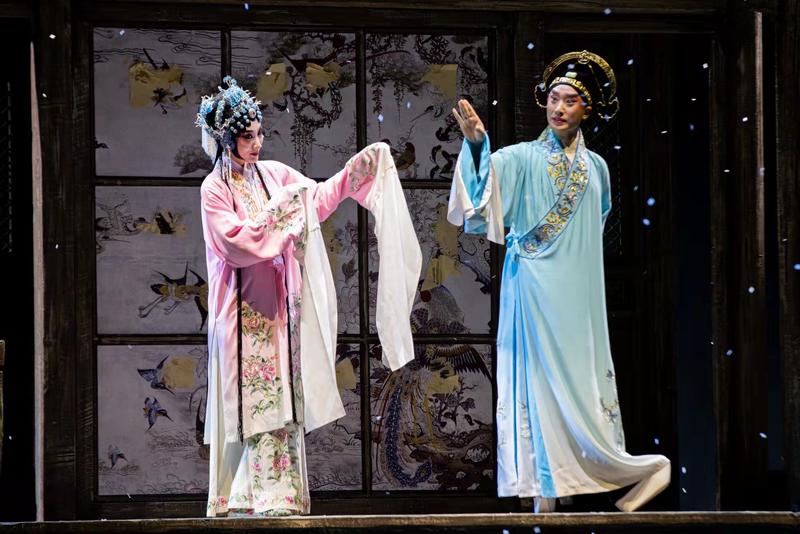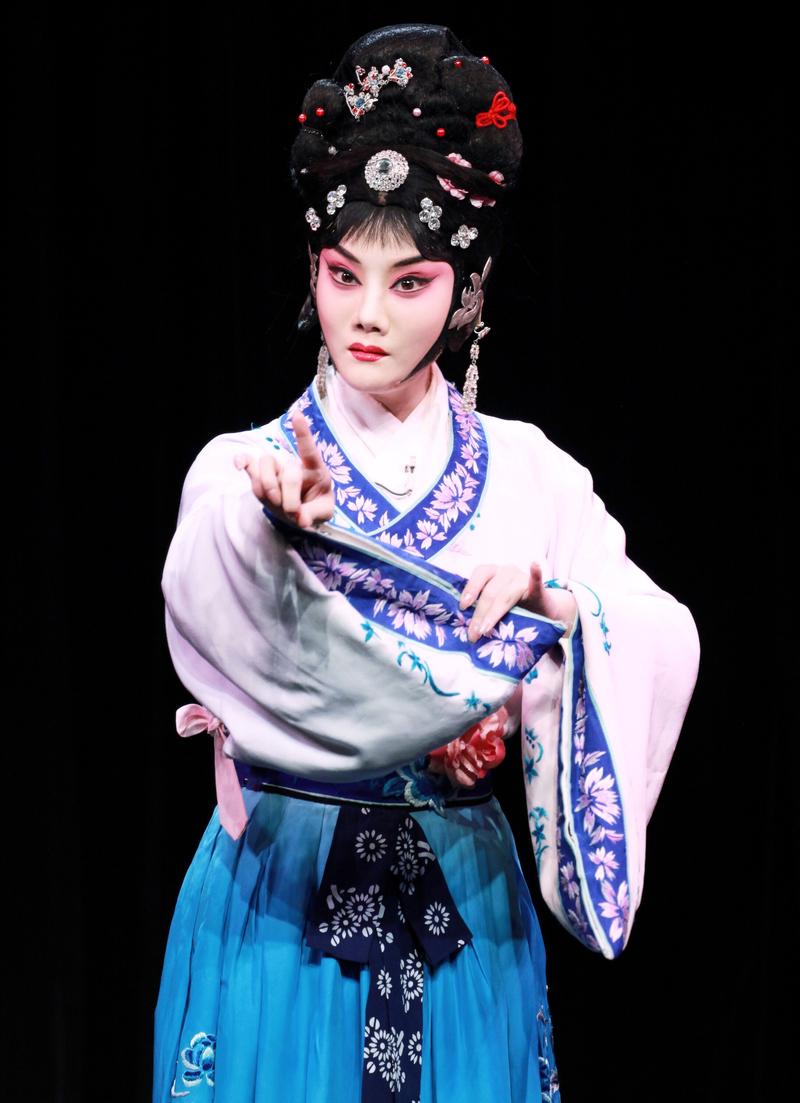This year's Beijing theater festival will include a section on traditional art forms such as Quju Opera, Chen Nan reports.
 Interrupted Dream, featuring veteran actor-director Chen Peisi (second from the left) and his son, actor Chen Dayu (left) will be staged from Oct 12 to 23 at the Tianqiao Performing Arts Center in Beijing. (PHOTO PROVIDED TO CHINA DAILY)
Interrupted Dream, featuring veteran actor-director Chen Peisi (second from the left) and his son, actor Chen Dayu (left) will be staged from Oct 12 to 23 at the Tianqiao Performing Arts Center in Beijing. (PHOTO PROVIDED TO CHINA DAILY)
Lao She Theater Festival has been an annual celebration of the relationship between theater and literature since it was launched in 2017.
In its sixth year, the festival will start on Sept 14 and run through December with more than 50 performances of over 20 theatrical productions adapted from classic literary works, as well as over 50 public events such as workshops and forums.
I am glad to see that the festival has added a new section on traditional Chinese operas, which will offer audiences more theater experiences.
Shu Ji, Lao She’s eldest daughter
The Chinese play Faces in the Crowd will open the festival and be staged from Sept 14 to 18 at the Poly Theater in Beijing. Adapted from author Feng Jicai's collection of 36 short stories, all set in the port city of Tianjin, the play portrays a range of characters, 54 in total, such as a doctor, a street food seller and a female bar owner, living between the late 19th and early 20th centuries.
According to the play's producer Liu Zhongkui, the idea of turning Feng's work of the same name into the play started some eight years ago. Directed by Zhong Hai and adapted by playwright Huang Weiruo, the play features artists from Tianjin People's Art Theater, as well as actress Liu Mintao, who has worked in movies and TV dramas.
"Feng's stories resemble literary sketches in simple, short and witty styles and often end with a moral lesson. The stories are amusing and moving. We hope audiences will have a great time watching the play just as people have while reading Feng's book," says the producer.
 The classic Kunqu Opera piece, The Peony Pavilion, will be another highlight of this year's Lao She Theater Festival. (PHOTO PROVIDED TO CHINA DAILY)
The classic Kunqu Opera piece, The Peony Pavilion, will be another highlight of this year's Lao She Theater Festival. (PHOTO PROVIDED TO CHINA DAILY)
Another Chinese play, Interrupted Dream, a collaboration between playwright Yu Yue and veteran actor-director Chen Peisi, will be staged from Oct 12 to 23 at the Tianqiao Performing Arts Center in Beijing. The name of the play is taken from a scene in The Peony Pavilion, a romantic tragedy play written by dramatist Tang Xianzu of the Ming Dynasty (1368-1644) and a well-known Kunqu Opera piece.
Interrupted Dream centers on a Kunqu Opera troupe during the civil war in the country. A play within a play, it depicts the troupe of the traditional art form going through the ups and downs of wartime. Chen plays the role of the head of the troupe. A comedian and a household name in China, Chen has worked with playwright Yu since 2015 on a Chinese play, The Stage, which is also a story about a drama ensemble in troubled times, but with some comedy.
"Interrupted Dream is quite different and doesn't have elements of comedy," Chen says, adding that the audience still like him in it.
 The classic Kunqu Opera piece, The Peony Pavilion, will be another highlight of this year's Lao She Theater Festival. (PHOTO PROVIDED TO CHINA DAILY)
The classic Kunqu Opera piece, The Peony Pavilion, will be another highlight of this year's Lao She Theater Festival. (PHOTO PROVIDED TO CHINA DAILY)
The play was sold out when staged at the National Center for the Performing Arts in Beijing from Aug 18 to 21.
Other highlights of the upcoming festival include Red Sorghum, by Jiangsu Center for the Performing Arts, adapted from the Chinese novel of the same name by Nobel Prize-winning author Mo Yan, and the Chinese version of the Russian musical, Anna Karenina, based on the novel of the same name by Russian master writer Leo Tolstoy.
Zhang Haijun, initiator of Lao She Theater Festival, says it is named after Chinese writer Lao She (1899-1966), whose works have inspired generations and have been adapted into plays, movies and TV dramas.
Lao She gave vivid descriptions of the lives of common people in his works, reflecting the social reality of his time. Born as Shu Qingchun in a Manchu family in Beijing, he specialized in depicting the local culture with humor and use of the city accent.
"The stage has a unique atmosphere, allowing plays to really bring the core of a book to the center. For book lovers, it's a totally different experience when watching a play and for theater lovers, it's a good chance to learn about the original work," say Zhang.
This year, traditional art forms such as Kunqu Opera, Yueju Opera and Peking Opera will also be featured at the festival for the first time.
 The Jingju Theater Company of Beijing will stage the Peking Opera, Ma Qian Po Shui, which premiered in 2000. This is the first Peking Opera that the company has made for small theaters. (PHOTO PROVIDED TO CHINA DAILY)
The Jingju Theater Company of Beijing will stage the Peking Opera, Ma Qian Po Shui, which premiered in 2000. This is the first Peking Opera that the company has made for small theaters. (PHOTO PROVIDED TO CHINA DAILY)
Since it was founded in 1959, Beijing Quju Opera Troupe has been staging shows adapted from Lao She's works such as Rickshaw Boy and Four Generations Under One Roof. So far, it has produced about 20 works based on his works.
In 1952, Lao She wrote a play, The Willow Well, in an art form that he invented, based on Beijing's local Quyi art, and named it Quju Opera.
"Like Lao She's work, Quju Opera pieces are known for their depictions of Beijing's local culture, especially the use of Beijing dialect and the portrayal of ordinary people," says Cui Di, the director of Beijing Quju Opera Troupe.
This year the company is celebrating the 70th anniversary of the art form with a series of performances, both classic Quju Opera works and new ones. The troupe has produced a new play, The Life of Mine, based on Lao She's novel of the same name, telling the sad story of a lowly ranked policeman in Beijing during the early 20th century. It will be staged during the festival on Oct 22 and 23.
Lao She was not only influenced by Western literature but also traditional art forms, for which he wrote scripts, according to Shu Ji, Lao She's eldest daughter, who has sent a congratulatory letter to this year's Lao She Theater Festival.
"I am glad to see that the festival has added a new section on traditional Chinese operas, which will offer audiences more theater experiences."
Contact the writer at chennan@chinadaily.com.cn


